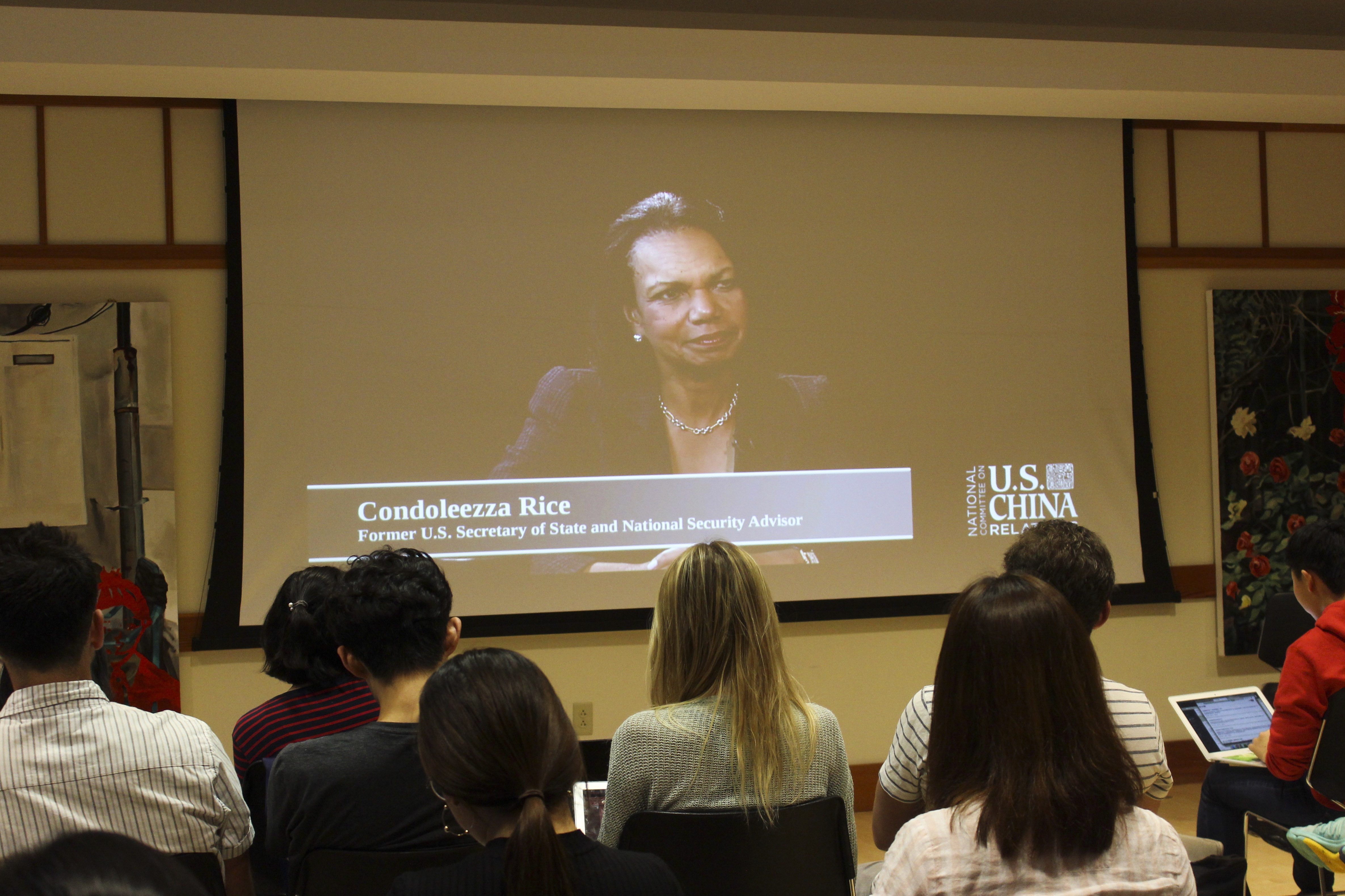
Spencer Dean, Staff Writer
Students and faculty gathered at the College of East Asian Studies this past Tuesday, Oct. 9, to participate in a town hall event which featured a webcast of former U.S. Secretary of State and National Security Advisor Condoleezza Rice. In a broadcast reaching over 100 town hall locations, Rice discussed United States-China relations.
The National Committee on U.S.-China Relations, whose president moderated the interview, hosts this event annually. Past interviewees include former President Jimmy Carter and former National Security Advisor Susan Rice. This year, the University was invited to screen the webcast in conjunction with a presentation by a local host.
Attendees were encouraged to submit questions for the moderator to ask Rice via Twitter. Out of the several Twitter questions selected, one was submitted by Mathias Valenta ’20.
“In what ways can liberal nations such as the U.S. encourage an increasingly powerful China to abandon the use of force and integrate into the system of international law?” Valenta asked.
Rice first commended the importance of the question at hand, then answered by advocating for Chinese policies with broader definitions of national interest.
“There are kind of two ways that great powers act in the international system,” Rice said. “One is that they act only on their own interests in the narrowest sense of their own interests, and everybody else you’ll just have to get out of our way. The other is a sense that you have a broader definition of national interest which includes the idea that if others are prosperous—if others enjoy peace—you’re better off too…. I would say to China, ‘If you’re gonna play on the big stage, try to do it in a way that makes the world more prosperous and peaceful for everybody, not just for China.’”
Valenta, a History and Economics major, was drawn to the town hall event due to a fascination with foreign policy, specifically the question of how to achieve a system of international order where violence no longer exists.
“The United States has always been a proponent of international law and, you know, equality and rules determining how we behave with one another,” Valenta said. “It seems that China has a very different, more power-oriented vision of how international relations should be formed.”
Valenta said he agreed with Rice on the point of encouraging China, through primarily diplomatic means, to participate in international organizations and conversations.
Preceding the webcast, each venue had a local China expert or panel discuss the topic. Director of the Allbritton Center for the Study of Public Life and Professor Peter Rutland led this segment of the event.
Rutland and Rice’s presentations stressed several of the same topics, including trade dynamics, the flow of ideas and intellectual property, and activity in the South China Sea.
Rutland spoke first about the trade gap between the United States and China. China’s recent economic growth—which is occurring at unprecedented rates—has been heavily export-led, fueled by demand in the United States especially. Rutland described this exchange of goods and services as mutually beneficial.
“The U.S. gets to buy a lot of cheap goods that go into Walmart and so on, and that boosts the living standards of Americans,” Rutland said. “China benefits because it has the jobs and growth.”
According to the Office of the United States Trade Representative, the United States goods and services trade deficit with China was $335.4 billion in 2017. United States exports were $187.5 billion and imports were $522.9 billion.
“China seems comfortable with this,” Rutland said. “This is the engine of their growth and they’re comfortable lending the U.S. the money to fund the deficit.”
But Rutland explained that President Trump and others are not satisfied with this asymmetrical exchange and are currently making efforts to adjust the imbalance through tariffs. In September, the Trump administration announced it would impose tariffs on roughly $200 billion worth of Chinese imports. Since then, the President has said he is prepared to impose tariffs on an additional $267 billion.
Rice, emphasizing her support of free trade, said that she believes there are other ways the United States could achieve reciprocity without relying so heavily on tariffs.
“What the administration has said is, ‘Our only tool is tariffs, so we’re going to use tariffs and use tariffs until we get a response,’” Rice said. “I think we have many other tools at our disposal. One is that we do have the ability to look more closely at Chinese investment here if American investment cannot be done there.”
Rice elaborated, saying that there are whole segments of the Chinese economy that are closed to foreign investment. She believes the Chinese economy would increase success with more openness and that the U.S. should press for reciprocity.
On the topic of trade relations, both Rice and Rutland dwelled upon the notion that this exchange is not just about the flow of goods, but also of ideas. Rice cited stories of American CEOs who, drawn by cheap labor, were forced into joint ventures in China only to lose their intellectual property.
“There is work that could be done to change some of the structural issues that are leading to some of these trade imbalances,” Rice said.
Spencer Dean can be reached at srdean@wesleyan.edu.